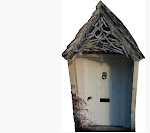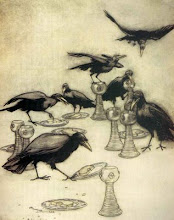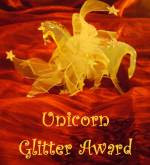Thursday 25 November 2010
Chagford Filmmaking Group
Chagford Filmmaking Group, the intrepid group of fairy tale filmmakers from Devon, have got lots of exciting things going on at the moment. The clip above is the opening of their first feature film, Sir Lanval, a twelfth century fairy tale. They shot it in fifteen epic days in two countries on a budget of just £25,000!
This weekend, as part of the Fantasy, Faeirie and Visionary Arts event at the Flavel Arts Centre in Dartmouth, there is a Talk On The Filming of Sir Lanval by Elizabeth-Jane Baldry (director and co-writer of the film) on Saturday at 12noon. This will include clips from the film and a chance to hear about behind-the-scenes adventures, and tales of pigs, maggots and magical white horses appearing from nowhere. On Sunday 28th at 11.30am, there will be a Screening of Peerifool: An Orkney Fairytale - a tremendous tale about three little girls who outwit an ogre. And it's full of porridge fairies! (Film duration = 40mins).
Also currently at the Flavel is an Exhibition of Costumes and Other Delights from the film, which runs until the end of the month. And at Exeter Castle the Shared Legends Exhibition of newly commissioned artworks inspired by the Lanval story opens on the 6th December and runs until the 18th. And it features the work of internationally known painters, sculptors, and graphic artists such as Brian Froud, Wendy Froud and Alan Lee as well as young rising stars in the mythic arts field (there is a wonderful post by Rima Staines over at The Hermitage about her experience of creating work for the exhibition).
This is all part of the group's Shared Legends Project, a unique cultural exchange between two countries that share a rich mythic heritage, which has been funded by the European Union and South West Screen.
Monday 22 November 2010
'Happily Ever After' exhibition

'Happily Ever After' an exhibition of work by Su Blackwell opens at the Long and Ryle Gallery on Thursday 25th November and runs until the 18th December, 2010
Su says...
As in many recent works I will be focusing on fairy tales, with their haunting, dream-like atmosphere. This exhibition broadly explores the role of marriage within the fairy tale. In many fairy tales, marriage acts as a kind of a closing sequence for the “happy ending”, simply because it was an expected stage of life for women during the periods in which these tales were first told. In these new works, I question a different type of ending.
And the Long and Ryle site gives an insight into the way Su works...
Using a scalpel she cuts and glues the pages of books to create miniature dioramas glowing with lights in wood and glass boxes, like Victorian relics found in a museum of intrigue. She finds her books – or rather lets them find her – by trawling through second-hand book shops. She always reads the book first and this in turn inspires the work.
If you're in London I urge you to get to the exhibition, but if, like me, you're too far away there are at least lots of wonderful pictures to get lost in on Su's site.
Image: Jorinde and Jorindel, copyright Su Blackwell
Wednesday 17 November 2010
Two fairy tale related calls for papers...

30 March 2011
CALL FOR PAPERS
A one day conference hosted by the School of English, University of St Andrews, Kennedy Hall, St Andrews, Scotland
George MacDonald (1824-1905) is most often discussed in terms of what came after: his role in the development of fantasy literature and his influence on writers such as C. S. Lewis and J. R. R. Tolkien. Though providing valuable insights into MacDonald’s legacy, this emphasis tends to obscure his involvement in his own time. MacDonald was a Victorian. His works attest to his wide knowledge of his time and culture, and his deep engagement with the issues of the day.
George MacDonald among His Contemporaries looks to re-establish MacDonald’s place within his own context. We invite proposals for a variety of disciplines for papers and presentations which offer critical reinvestigation of MacDonald’s work. We particularly welcome papers that look beyond MacDonald’s fantasies to consider other aspects of his works.
Relevant topics might include:
- examinations of MacDonald and social issues, such as women’s rights and suffrage, racism and abolition, poverty and social welfare, animal rights, et al.
- genre criticism of MacDonald: historical fiction, sensationalism, romance, et al.
- gothic influences on MacDonald
- medievalism in MacDonald’s poetry and fiction.
- MacDonald and science or pseudo-science: evolution, vivisection, and mesmerism
- MacDonald’s literary criticism
- MacDonald and Victorian readings of Shakespeare
- critical re-examination of MacDonald’s poetry
- the interplay of poetry and prose in MacDonald’s works
- the interfacing of visual arts and MacDonald’s narratives, notably his connection to the Pre-Raphaelites
- MacDonald’s role in the Scottish preaching tradition
- MacDonald in relation to other Victorian literary figures: Dickens, Eliot, Kingsley, the Rossettis, Tennyson, Ruskin, et al.
- MacDonald and Scotland: Burns, Scott, Hogg, the Highlands, et al.
Keynote speakers will be Stephen Prickett and David Robb.
Papers will be 20 minutes. Please submit a 300-word abstract, in .doc, .docx, or .pdf format, with biographical information to Ginger Stelle (gs345 [at] st-andrews.ac.uk) and John Patrick Pazdziora (jpp6 [at] st-andrews.ac.uk) before 15 January 2010.
--------------------------------------------------------A two-day international conference hosted by the Film and Literature Programme of the University of York's Department of English and Related Literature in association with The Centre for Modern Studies
(please note these are the new, confirmed dates and have been adjusted by one day since I first posted this)
CALL FOR PAPERS
This forthcoming conference invites renewed reflection on fundamental, inherited tales as these have found self-reinventing expression in film and literature post-1900. It seeks to interrogate the dramatic, poetic and visual character of culturally core stories (fairy/mythic/classical/religious/Shakespearean etc), the formal operations and cultural force of their variant tellings (and showings) across media and moment, and the ways in which their psychological, social, political and aesthetic functions have been interpreted and employed.
Abstracts are solicited for individual 20-minute papers on the theme of the conference (interpreted in literary or film terms, or both). Proposals of pre-constituted panels (composed of two or three 20-minute papers) are also welcome.
Questions informing case studies might include (without being limited to):
- Why do some stories endure across multiple retellings while others fall into neglect?
- What primal impulses are encoded, fears expressed or defused and/or desires satisfied in those that resurface repeatedly in altered guises?
- Which narrative elements and characters have proved largely stable across time and place, apparently immune to cultural disruption, and which have been gently or radically adjusted in response to other cultural-historical forces?
- How have particular post-1900 literary and screen engagements with culturally embedded stories appropriated, revivified and disseminated those inherited tales in distinctive and/or culturally illuminating ways?
- How have the behavioural models promoted, social imperatives implied, modes of telling adopted and artistic allegiances embraced in the ongoing lives of particular tales been revised over time to fit new circumstances, new audiences and new media?
- How have theories of transmission, narrative endurance and narrative change accounted for the culturally revealing reinventions of various fundamental story pools?
- Which theories of narrative transmission, inter-medial adaptation and/or inter-textuality can illuminate the ongoing life of a story most tellingly? (And, perhaps, which have proved interpretively diversionary or limiting?)
Panels have thus far been suggested on the following themes: classical subjects, scriptural/religious subjects, Shakespearean subjects, fairy tales for children, fairy tales for adults, the transculturing of inherited myths. Contributors are welcome to submit with these proposed panels in mind, or in any other area in line with the theme of the conference.
Abstracts of not more than 250 words should be submitted, not by attachment but within the body of the email, to: film-and-literature@events.york.ac.uk
Deadline for receipt of abstracts: Tuesday 21st December 2010.
A brief personal biog-sketch (not more than 100 words) including institutional affiliation, current appointment/stage of study, principal publication(s) (where applicable) and main research interests, should be included in the same email. All submissions will be responded to, and all contributors notified, by Tuesday 11th January 2011. Registration details to follow.
Conference chair: Judith Buchanan (judith.buchanan@york.ac.uk)
Addition to post: There are now more details about the conference here.
Illustration by Dorothy Lathrop from The Light Princess by George Macdonald via the chawed rosin
Thursday 11 November 2010
New tales online

I have't had chance to dip into these yet because I'm busy putting Issue 6 of New Fairy Tales together, but there are lots of Hansel and Gretel tales to read in Issue 4 of Enchanted Conversation and the first issue of Wildberries, a new journal of mythic fantasy, is now online too.
Illustration by Kay Nielsen, from the book Hansel and Gretel and other Stories by the Brothers Grimm
Tuesday 9 November 2010
Once upon a time... short story and poetry competition

The Chapel Gallery in Ormskirk, Lancashire are looking for modern fairy tales and winter poems. Here are all the details you'll need to enter:
Two writing options and two age categories per option:
Short Story: A Modern Fairytale. Maximum words: 2000. Submission fee: £5.00. Junior Category entries free.
Poem: A Winter Poem. Maximum lines: 45. Submission fee: £5.00. Junior Category entries free.
Adult Category: Over 16. Junior Category: Under 16.
How to enter:
This competition is open to all UK based writers.
* Work submitted must be original and in English.
* Work submitted must be typed in Microsoft Word using Times New Roman font, size 12pt and double-spaced.
* Work should be stapled, bound or held together in a file. Loose sheets cannot be accepted.
* Include your name, age category, address, phone number and email on a cover page attached to the submission.
* Work must be submitted by post AND email to the Creative Writing Competition, Chapel Gallery (address below) AND via email to chapel.gallery@westlancs.gov.uk by Saturday 8 January 2011.
FREE workshops Places are limited. Book early to avoid disappointment.
Short Story Writing: Skelmersdale Library, Southway, Skelmersdale WN8 6NL. Saturday 27th November, 1.30 to 3.30pm.
Poetry Writing: Ormskirk Library, Burscough Street, Ormskirk L39 2EN. Saturday 4th December, 1.30 to 3.30pm.
Book through Chapel Gallery with £5.00 deposit to be returned at workshop on attendance.
Selection process:
The work will be judged by Professor Robert Sheppard, Professor of Poetry and Poetics and Programme Leader for the MA in Creative Writing at Edge Hill University with Ruth Heritage, Director, They Eat Culture / Lancashire Writing Hub and Helen Juste, Arts Development Manager, West Lancashire Borough Council. Works shortlisted will be displayed at the Chapel Gallery plus participating cafés and libraries.
Prizes:
A Modern Fairytale, Adult Category: £250 A Modern Fairytale, Junior Category: Story to be illustrated
A Winter Poem, Adult Category: £250 A Winter Poem, Junior Category: Poem to be illustrated
All prizewinning works will be published on the Chapel Gallery website and the websites of partners involved in the project. There will be a presentation event where prizes and certificates will be awarded and winners will have the opportunity to have their story or poem read aloud. Successful applicants will be contacted regarding the presentation date.
Tuesday 2 November 2010
Video from the Boston Book Festival: My Mother She Killed Me, My Father He Ate Me
My Mother She Killed Me, My Father He Ate Me at Boston Book Festival 2010 from Boston Phoenix on Vimeo.








